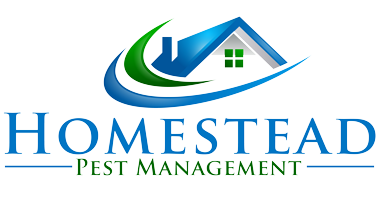Watch Out for Wasps!
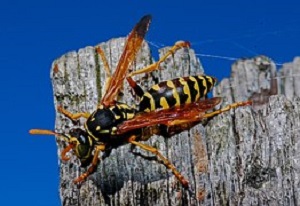
With warmer weather approaching, many flying and stinging creepy crawlies will be making their way our of hibernation and be back in business again. Wasps are just one of many of these troublesome critters that can make life difficult if they are too abundant.
According to NationaGeographic.com, “wasps make up an enormously diverse array of insects, with some 30,000 identified species. We are most familiar with those that are wrapped in bright warning colors—ones that buzz angrily about in groups and threaten us with painful stings.
But most wasps are actually solitary, non-stinging varieties. And all do far more good for humans by controlling pest insect populations than harm.
Wasps are distinguishable from bees by their pointed lower abdomens and the narrow “waist,” called a petiole, that separates the abdomen from the thorax.
They come in every color imaginable, from the familiar yellow to brown, metallic blue, and bright red. Generally, the brighter colored species are in the Vespidae, or stinging wasp, family.
All wasps build nests. Whereas bees secrete a waxy substance to construct their nests, wasps create their familiar papery abodes from wood fibers scraped with their hard mandibles and chewed into a pulp.
Wasps are divided into two primary subgroups: social and solitary. Social wasps account for only about a thousand species and include formidable colony-builders, like yellow jackets and hornets.
Social wasp colonies are started from scratch each spring by a queen who was fertilized the previous year and survived the winter by hibernating in a warm place. When she emerges, she builds a small nest and rears a starter brood of worker females. These workers then take over expanding the nest, building multiple six-sided cells into which the queen continually lays eggs. By late summer, a colony can have more than 5,000 individuals, all of whom, including the founding queen, die off at winter. Only newly fertilized queens survive the cold to restart the process in spring.
Solitary wasps, by far the largest subgroup, do not form colonies. This group includes some of the wasp family’s largest members, like cicada killers and the striking blue-and-orange tarantula hawks, which can both reach 1.5 inches (3.8 centimeters) in length. Whereas social wasps use their stingers only for defense, stinging solitary wasps rely on their venom to hunt.
Most animals have developed a well-earned fear of stinging wasps and give them a wide berth. Creatures who haplessly stumble upon a wasp colony or have the audacity to disturb a nest will find themselves quickly swarmed. A social wasp in distress emits a pheromone that sends nearby colony members into a defensive, stinging frenzy. Unlike bees, wasps can sting repeatedly.”
While beneficial to our ecosystems, wasps can be a real problem, particularly for children or those with allergies. At Homestead Pest Management, we can help you prevent or get rid of wasps and other flying and crawling pests. Contact us today for a professional assessment of all your West TN pest control needs!
[Link] Post Type Format
https://www.aivahthemes.com/
Pellentesque facilisis ipsum sed urna ornare vulputate. In ornare magna libero. Donec fermentum nibh ut massa tincidunt interdum nec eget tellus. Ut vehicula est nunc. Sed consectetur tempus mauris vel euismod. Nam commodo porttitor tortor, sit amet porta diam porttitor at. Nam tincidunt mollis semper. Vestibulum ligula ante, imperdiet sit amet semper et, varius tempor nibh. Nam interdum diam quis tortor interdum accumsan. Morbi tempor vulputate lacus. Nam a eros vitae urna ultricies ullamcorper. Aliquam vitae libero ipsum, condimentum pharetra dolor. Mauris nec leo ante.
Audio Post Type Format
Praesent sodales, ex non consequat imperdiet, quam dolor interdum ante, non pellentesque turpis magna sit amet nunc. Curabitur vel lacinia odio, vitae dictum erat. Cras auctor nisi sit amet nisi suscipit, in porttitor eros pharetra. Donec ornare orci lacinia laoreet cursus. In hac habitasse platea dictumst. Morbi id dictum justo. Phasellus lorem nibh, dignissim in tellus et, facilisis feugiat tortor. Donec cursus nunc in erat viverra facilisis. Phasellus tristique leo porta velit efficitur, tempor aliquam eros congue. Proin congue ac velit nec facilisis. Vestibulum non scelerisque erat. Fusce elementum sem in augue interdum, vitae maximus dolor imperdiet. In quis faucibus dolor, in dapibus enim. Duis eu faucibus diam, at vehicula justo. Vivamus viverra aliquam magna, id bibendum leo finibus in.
Video Post Format
Nulla facilisis odio vitae odio laoreet rutrum. Integer enim felis, gravida ut porttitor at, dapibus vitae elit. Cras quis leo a urna viverra dictum suscipit eget risus. Vivamus felis urna, tristique sed malesuada quis, molestie vitae magna. Sed id mi non nisl commodo euismod eget sed orci. Mauris eu auctor magna. Maecenas luctus turpis sit amet leo pellentesque vitae sodales ligula pharetra.
Cras vehicula sapien eu enim imperdiet imperdiet. Nam vel turpis urna. Nunc a massa vitae libero fermentum bibendum ut quis dolor. Quisque ac elit augue. Donec lobortis nisi in quam molestie mollis. In quis nulla ut dolor viverra semper id eget elit. Phasellus velit sapiean, dignissim non ornare in, facilisis sed mauris. Proin sed blandit lectus.
Why Choose HPM?

What makes Homestead Pest Management the best choice in West TN pest control? Let’s just break it down:
Homestead Pest Management, Inc. was founded in 1976 by Matt & Diane Markowski, and it is still owned and operated by the Markowski family. It is currently owned by their son David Markowski and their daughter Donna Tyler. Their son-in-law, Charles Moore, is also our Pest Control Manager.
Homestead Pest Management uses the latest techniques to eliminate pests, including using baits and low odor liquids. We were the first company in this area approved to use termite baiting systems, and we strive to always use products that will have the least amount of impact on the environment. All of the technicians employed by Homestead Pest Management are state certified and undergo continuous training to stay on top of the newest techniques and developments in our field.
Matt Markowski was instrumental in forming the Local Pest Control Association, serving as its First President. He also served the Tennessee Pest Control Association as a Director, President and Committee Chairman. Diane Markowski has served as Secretary, Treasurer, and President of the Local Pest Control Association and has also served the Tennessee Pest Control Association as President, Director and Parliamentarian. She has additionally served as Director and Committee Chairperson with the National Pest Management Association. David Markowski has been President of the Local Pest Control Association and President of the Tennessee Pest Control Association. Donna Tyler is currently Secretary/Treasurer of the Local Pest Control Association.
Let Homestead Pest Management, Inc. demonstrate our expertise and commitment to West TN by assessing your home and property and providing you with a customized plan of attack that consists of both extermination and maintenance, as needed. Contact us today, and let us take care of all your pest control needs!
The Cricket Conundrum
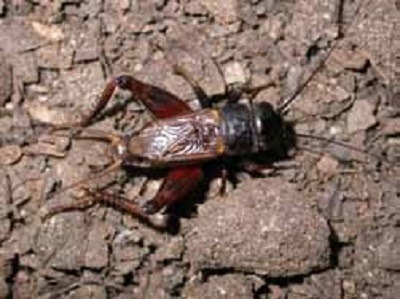
Crickets, though not necessarily typically considered a pest, can damage foliage and property. According to the University of Arizona’s Center for Insect Science Education Outreach, the following information is true about these often cute but noisy little bugs:
“Crickets may be:
- Brown to black
- Front wing varying in length, covering half to entire abdomen
- Antennae about as long as distance from head to end of abdomen
- Wings held flat over body
- Hind wings folded and hidden under leathery front wings
Adult Males and Females
Female with long ovipositor (ventrally attached) in rear (may appear as two pieces); both sexes have cerci (segmented, tail-like appendages attached dorsally). The wings are fully extended over the abdomen. Some species may not have wings.
Immatures (different stages)
Immatures look like adults but do not have fully developed wings. Older nymphs may show development of wing pads. The female’s ovipositor begins to show before it is an adult and increases in length with each successive molt.
Natural History
Food
Crickets are omnivores and scavengers feeding on organic materials, as well as decaying plant material, fungi, and seedling plants.
Habitat
Crickets live under rocks and logs in meadows, pastures and along roadsides. Many are nocturnal.
Predators
Spiders, some wasps, ground beetles, birds, small rodents, and lizards are cricket predators.
Interesting Behaviors
To attract mates, males produce a sound made by rubbing their forewings against each other. The resulting chirping sound is picked up by the female’s ears on her front legs. The chirp sounds are different for each species so that individuals can find their own species. Females lay eggs in the soil with their ovipositor.
Impact on the Ecosystem
Positive
Crickets breakdown plant material, renewing soil minerals. They are also an important source of food for other animals.
Negative
Crickets may injure seedlings and large numbers can be destructive. Males songs can be quite loud.”
At Homestead Pest Management, we can cure your cricket conundrums and attend to all your other West TN pest control needs. Contact us today to set up an assessment or to get more info about our comprehensive services.
Homestead – Your West TN Pest Experts!
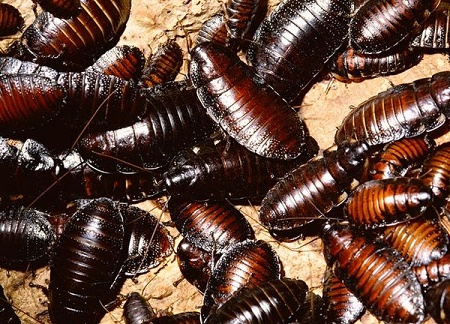
When you call Homestead Pest Management we listen to your problem and prescribe a treatment that will fit your individual needs after a thorough property inspection. We suggest the most beneficial service for your needs without overcharging for additional services you don’t need, because we feel that you should only pay for what is necessary to properly protect your property and not what makes us the most money.
With Homestead Pest Control, you have multiple options for Pest Control including:
- One-Time Service Visits
- Monthly Service Visits
- Bi-Monthly Service Visits
- Quarterly Service Visits
- Inside Only Treatments
- Outside Only Treatments
- And MORE!
At Homestead Pest Management, we live with our families in West Tennessee and understand that times are hard for everyone. For that reason, we do not hold our fellow residents to a binding contract. If you need to cancel at any time, you can, and we will still be here for you when conditions improve.
Homestead Pest Management can take care of all your pest control needs whether it be roaches, ants, termites, mosquitoes, spiders or anything else that’s bugging you. Contact us today to schedule a complete individualized assessment of your home and property.
Spring Cleaning can help Control Pests
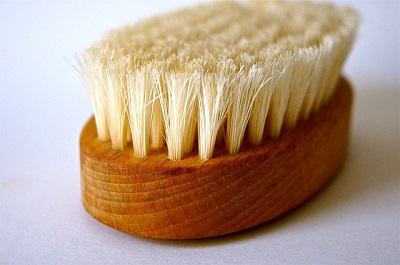
Spring is just around the corner, and if you are concerned about the possible influx of spring pests, or if you have pests you want to be rid of, a thorough Spring cleaning is one of your best defenses against common spring pests including spiders, cockroaches, and carpenter bees.
Spiders and roaches can both enter homes through cracks and crevices and then hide. An effective cleaning can rid a home of most of these stubborn pests, and help make the homeowner aware of problem areas that need to be sealed. Simple alterations like switching to plastic containers from cardboard or getting items up off the floor can help reduce pests while organizing your home more efficiently.
As you are cleaning, keep an eye out for any wood damage that could be from termites or carpenter bees. This can typically be found on decks, gutters, fences – basically anything made of wood can be victimized by these stubborn pests.
Some other things you can do to reduce pest activity include:
- Reduce sources of moisture
- Remove food temptations
- De-clutter
Once your home is clean and organized, your next step is to be proactive and get a personalized pest assessment from our professionals at Homestead Pest Management. Whether you are looking to prevent infestations or to eliminate them, HPM has all your pest control solutions. Contact us today for your West TN area pest control assessment and personalized plan of attack!
Choose Homestead Pest Management for a Pest-free New Year!

Homestead Pest Management, Inc. proudly has served the residential and commercial communities of West Tennessee with expert pest control services since 1976. This family owned and operate business began over 30 years ago and has pioneered many techniques and organizations dedicated to quality pest control.
Homestead Pest Management has a team of State Certified technicians who undergo continuous training to stay on top of the latest techniques and developments that affect our field and enhance our effectiveness against pests. We strive to provide our customers with the best quality service for their individual needs, at the most affordable price for their budget.
- Residential and Commercial
- Termite Control
- Pest Control
- Moisture Control
- Rodent Control
At Homestead Pest Management, we understand that proper protection from pests can be costly and for that reason we regularly provide Coupons to help our customers get the treatment they need to care for their property. Also be sure to Refer a Friend! Qualified Referrals from our customers will receive discounts on their next service call. Contact us today to find out more!
Merry Christmas from Homestead Pest Management!

